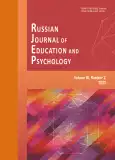Actual problems of formation of a socially active personality in the educational space of the university
- Authors: Serdyuk E.G.1, Muromtseva K.R.1,2
-
Affiliations:
- Admiral F.F. Ushakov State Maritime University
- Taganrog Institute of Management and Economics
- Issue: Vol 16, No 2 (2025)
- Pages: 451-472
- Section: Psychological Studies
- Published: 30.04.2025
- URL: https://journal-vniispk.ru/2658-4034/article/view/302890
- DOI: https://doi.org/10.12731/2658-4034-2025-16-2-819
- EDN: https://elibrary.ru/EWOMKK
- ID: 302890
Cite item
Full Text
Abstract
Background. In today's rapidly changing global transformations, individuals are losing the ability to control both internal and external processes. The high level of uncertainty in the environment creates a risky contextual field that destabilizes an individual's stable psycho-emotional state, leading to increased anxiety and feelings of helplessness. Individuals lose the capacity to manage their own emotions, choices, actions, and overall situations. Modern social reality emphasizes the need for developing a resilient, conscious personality with a socially active stance, capable of maintaining stability within a constantly evolving objective space by relying on a system of values, beliefs, and views. The authors propose an integrative approach to studying the complex mechanism of forming a socially active personality. This article analyzes the theoretical foundations of the phenomenon of awareness as a reflection of objective reality through objectification of meanings, which serves as a fundamental element of stabilization and resilience in conditions of environmental uncertainty, as well as reflexive, meaningful, and activity-based components.
Purpose. The study of mindfulness as the foundation for the formation of personal worldview within the framework of social and individual values.
Materials and methods. The main research method is scientific-theoretical analysis. The article is based on a range of sources, including foundational works, scholarly publications, and materials from conferences and seminars, which allows for a comprehensive examination of the development of a socially active personality in the educational context.
Results. The essence of the concepts "values," "value structure," "legal consciousness," and "patriotism" collectively enable an individual to take an active position in society by consciously integrating socially accepted norms into their inner world. It is essential to develop a priority direction—axiologizing the educational space of universities. A typology of values is considered, with basic traditional values serving as the foundation for the formation of patriotism and legal consciousness. These categories are examined in terms of the axiological basis of the pedagogical process as a whole.
About the authors
Elena G. Serdyuk
Admiral F.F. Ushakov State Maritime University
Author for correspondence.
Email: alenaserduk@yandex.ru
PhD in Sociology, Associate Professor
Russian Federation, 93, Lenin Ave., Novorossiysk, Krasnodar Krai, 353924, Russian FederationKristina R. Muromtseva
Admiral F.F. Ushakov State Maritime University; Taganrog Institute of Management and Economics
Email: krismurpsy@mail.ru
Psychologist, Department of Social and Psychological Support and Inclusive Education; Postgraduate Student
Russian Federation, 93, Lenin Ave., Novorossiysk, Krasnodar Krai, 353924, Russian Federation; 45, Petrovskaya Str., Taganrog, Rostov Region, 347900, Russian FederationReferences
- Aleksandrovsky, Yu. A. (2008). Concise psychiatric dictionary (2nd rev. & exp. ed.). Moscow: RLS-2009. 143 p.
- Anufriyev, E. A. (1969). Social activity of personality. Moscow: Znanie. 37 p.
- Great Encyclopedic Dictionary (2nd rev. & exp. ed.). (1997, 1999, 2001, 2004). Chief editor: A. M. Prokhorov. Moscow: Big Russian Encyclopedia; Saint Petersburg: Norint. 1456 p.
- Krovyakov, V. M. (2006). Psychotraumatology. Ekaterinburg: UMCI UPIs Publ. 441 p.
- Langlé, A. (2017). Meaning-filled life: Logotherapy as a tool for help in life (trans. from German by Ya. Dyukov). Moscow: Genesis. 144 p.
- Maslow, A. H. (2013). Motivation and personality (3rd ed.) (trans. from English by T. Gutman, N. Mukhina). Moscow etc.: Piter. 351 p.
- Mitrofanova, N. V. (2017). Problems and prospects of sustainable development of maritime transport industry: collective monograph (Filipskaya N. Yu., Botnaryuk M. V., Kocheganova I. A., et al.). Ufa: Aerterna. 137 p.
- Nemov, R. S. (2007). Psychological dictionary. Moscow: VLADOS. 559 p. ISBN: 978-5-691-01515-1 EDN: https://elibrary.ru/QXSRFZ
- Pergamenshchik, L. A. (2004). Crisis psychology: textbook. Minsk: Visshaya Shkola. 239 p. ISBN: 985-06-1010-7 EDN: https://elibrary.ru/JGEOHI
- Perls, F. S. (2010). Gestalt seminars. Moscow: Institute of General Humanitarian Research. 348 p.
- Reber, A. (2000). Large explanatory psychological dictionary (trans. from English by E. Yu. Chebotarev). Moscow: Veche: AST. 1150 p.
- Rubinshteyn, S. L. (2012). Fundamentals of general psychology. Moscow etc.: Piter. 705 p. ISBN: 978-5-459-01141-8 EDN: https://elibrary.ru/QYEWHB
- Serdyuk, E. G. (2022). Formation of the value-meaning sphere of personality and level of anxiety. The European Proceedings of Social & Behavioural Sciences EPSBS, Vol. 125, pp. 349–357.
- Serova, N. V. (2018). The problem of a human being in modern philosophy of technique: Materials and reports of the All-Russian scientific and practical conference dedicated to the memory of Ivan Andreyevich Negodaev (March 29, 2018, Rostov-on-Don). Ministry of Education and Science of the Russian Federation, Federal State Budget Educational Institution of Higher Education "Don State Technical University", Don Philosophical Society. Rostov-on-Don: DGTU. 403 p.
- Sidorov, P. I., & Parnyakov, A. V. (2000). Introduction to clinical psychology: textbook for medical students. Moscow; Ekaterinburg: Akademproject: Delovaya kniga. 380 p.
- Skrylnikova, M. A. (2022). Main factors of adaptation of students with disabilities in higher education. In Science, Education, Youth: Horizons of Development: Proceedings of the II National Scientific and Practical Conference (March 19, 2022, Kerch)/ Editorial Board: E. P. Masyutkin et al. Kerch: FSBEI HE "Kerch State Marine Technological University", pp. 299–305. EDN: https://elibrary.ru/ZDGFPG
- Sobchik, L. N. (2005). Psychology of individuality: theory and practice of psychodiagnostics. Saint Petersburg: Rech'. 621 p. ISBN: 5-9268-0195-8 EDN: QXNRZP
- Frankl, V. (1990). Man's search for meaning (General editor: L. Ya. Gozman, D. A. Leontiev; introduction article by D. A. Leontiev, pp. 5–21; trans. from English and German). Moscow: Progress. 366 p. ISBN: 5-01-001606-0 EDN: https://elibrary.ru/YQCMMA
- Freud, S. (2024). Psychology of the unconscious. Peter (Ailib). 605 p.
- Yumartova, N. M., & Grishina, N. V. (2013). Awareness (mindfulness): psychological characteristics and instruments of measurement. Research of Graduates of Faculty of Psychology SPbSU, 1, pp. 267–273. EDN: https://elibrary.ru/RBGPOV
Supplementary files










